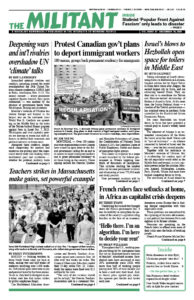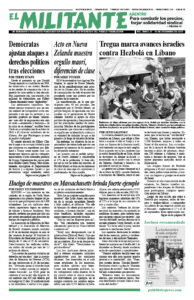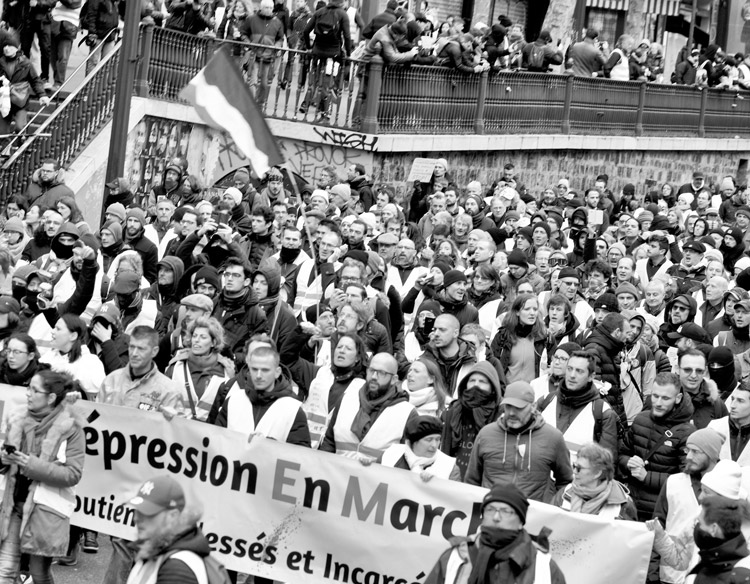Underlying the turmoil that brought down the French government Dec. 4 was its inability to strengthen the position of the country’s capitalist ruling families in the face of an economic downturn across Europe that is fueling sharper competition with their imperialist rivals.
These problems are exacerbated by the rupturing of decades-old economic and political ties between Paris and regimes in its former colonies.
Pressures are mounting on the French rulers to offload even more of their crisis onto the backs of working people.
French Prime Minister Michel Barnier used constitutionally mandated special powers to unilaterally impose a government budget Dec. 2 without parliamentary approval. Opposition parties then moved a no-confidence vote that led to the fall of his minority government, installed only three months ago by President Emmanuel Macron.
Days before Barnier’s diktat, Marine Le Pen — leader of the National Rally, the largest of the capitalist parties in France’s National Assembly — demanded Barnier scrap proposals to freeze cost-of-living raises on pensions, increase taxes on electricity and raise prescription costs. These measures will fall hardest on working people, already impacted by soaring prices.
The cost of French government borrowing rose above that of Greece’s government for the first time Nov. 28. Attempting to scare up support for the budget, Barnier’s spokesperson, Maud Bregeon, warned France faced a “Greek scenario.”
Beginning in 2009 Athens faced an unprecedented debt crisis. The rulers in France and Germany utilized their long-standing domination of the European Union to press Greece’s rulers to cut their spiraling debt by slashing jobs, wages and pensions in return for more loans. As successive Greek governments surrendered to these demands, the rulers in Paris and Berlin enriched themselves off the backs of workers in Greece.
During this crisis politicians in the stronger imperialist nations frequently used the derogatory term PIIGS to describe Europe’s weakest capitalist powers, Portugal, Italy, Ireland, Greece and Spain.
But today it’s Europe’s dominant powers, in Berlin, but also Paris, that face economic stagnation, as they confront rising competition for markets from Beijing and Washington. They also face the unprecedented effects of Moscow’s invasion of Ukraine, the largest ground war in Europe since World War II, and the continuing fallout from Hamas’ pogrom against Jews in Israel. This has highlighted the long-term weaknesses of the imperialist rulers in both Paris and Berlin.
French forces pushed out of Africa
Unlike Berlin, the French rulers have nuclear weapons and never became dependent on Moscow for their supplies of energy.
Moreover, they had a colonial empire. This included French West Africa, which Paris ruled directly from 1895 until 1958, when the oppressed peoples there won their independence. Since then the French rulers have sought to take advantage of historic economic, political and military ties with their former colonies to offset Paris’ decline, and to defend their reach in the imperialist world.
But today these links are being torn apart in the conflicts and social convulsions unfolding worldwide. The government of Chad announced it was severing its defense pact with France Nov. 28 and pressed Paris to take home the 1,000 troops it deploys there. The rulers of the United Arab Emirates and Moscow’s mercenary Wagner forces have provided military aid to the Chadian junta.
Ties to the government in Chad had been key to the French imperialists’ interventions in Africa. Troops from Chad were indispensable in aiding French military forces when they crushed Islamist groups battling to overthrow the government in Mali in 2013. French forces unleashed airstrikes against anti-government groups in Chad as recently as 2019.
The same day that the rulers in Chad announced they were cutting military ties with Paris, the government in Senegal pressed Paris to get its 350 troops out of its country. Senegal’s president, Bassirou Diomaye Faye, noted Nov. 28 that Beijing now provides Senegal with more loans and trade than Paris.
These steps by the regimes in Chad and Senegal follow moves by the ruling military juntas in Burkina Faso, Mali and Niger to cut ties with Paris and oust French troops. Each has turned to Moscow’s Wagner forces to help suppress Islamist groups battling to overthrow them.
French rulers’ crisis hits the EU
As the challenges facing France’s rulers mount, the impact of this political and economic turmoil reverberates across Europe. The euro fell close to a 14-month low against the U.S. dollar Dec. 2 on the announcement of Barnier’s budget decree.
Macron came to office promising to slash French government debt and transform the country’s faltering capitalist economy. This, he claimed, would enable him to convince Berlin to set up a common EU treasury with borrowing powers.
Not “as long as I live,” former German Chancellor Angela Merkel had responded to similar demands in 2012. Berlin, the dominant force in the EU, was never going to take responsibility for the debts of its weaker European “allies.”
From the beginning, the EU was set up as a protectionist trading bloc designed to advance the interests of Berlin and, to a lesser degree, Paris, against Washington and against their rivals in Europe. It was also aimed at aiding their unrelenting efforts to put the costs of their dog-eat-dog capitalist competition onto working people.
Macron’s policies at home have been met with working-class resistance. Tens of thousands took to the streets for months in 2018, in “yellow vest” protests against his government’s moves to impose a fuel tax and other assaults on their living standards.


